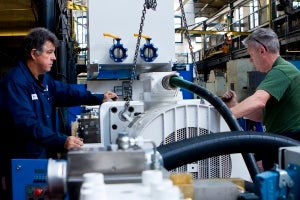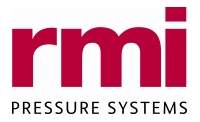
For industries involved in the processing of high-value commodities, it is essential that all plant and equipment used within an application is reliable.
In some instances, critical equipment will have a stand-by in place to ensure production can continue in the event of a failure or maintenance. However, delivering a product that can guarantee reliability, whilst enduring high workloads in harsh conditions, requires improved materials and engineering techniques; which all increase the purchase price.
Mike Sherman, marketing manager for RMI Pressure Systems, a company that specialises in manufacturing high-pressure, high-flow rate pumps for mining and heavy industry applications looks at the balance between cost and reliability and explains why spending more often leads to savings in the long run.
Design engineers and production managers would, at first glance, appear to be at odds when it comes to designing process equipment. The first will want to maximise reliability while the other needs keep costs low. However, by looking at the total cost of ownership (TCO) for high-pressure pumps these two points of view start to converge on a point where the requirements of each are satisfied.
In order to sell any quantity of a product or raw material, you must be recognised for producing a reliable and efficient service; otherwise, particularly where large volume orders are concerned, there will be little chance of being invited to bid. Once past this initial hurdle, it is vital that the claims for supply stability stand up to scrutiny and can be validated, otherwise the reputation of the manufacturer or producer could be in jeopardy.
To reach this point the plant equipment being used must be of an efficient design and employ materials, which will meet the specifications of the application. To surpass this position and to develop an improved model with greater reliability will require a certain degree of ‘over-engineering’; using materials and design concepts that may exceed the original specification, but which will afford a much greater level of reliability.
In today’s climate of matching plant equipment performance exactly to demand, there is less scope for engineering a machine to exceed targets, in heavy industries such as mining and steel making however, building something to last can make the difference between catastrophically expensive downtime and ultimate profitability.
So, for the pump design engineer, achieving his goal is relatively simple. The production manager at the end-user company, on the other hand, has a considerable balancing act to achieve – justifying the increased purchase cost against the improved reliability. This is where the TCO must be carefully calculated, taking into account all of the costs involved in operating the equipment, as well as the potential costs of lost production due to a breakdown.
TCO covers a wide range of costs and can be influenced by the design of the equipment. For example, long life bearings, which do not require regular lubrication, can reduce maintenance costs, while components designed to be easily exchanged cut the time to effect a repair. Using high- specification components within a robust design adds to the confidence of a reliable product, which can be borne out by extensive testing both during the design phase and the production cycle.
The key to this process is understanding all the potential costs involved in purchasing, maintaining and repairing the equipment in question and ensuring that the cost of lost production is properly represented. In this way, the true measure of reliability can be found and it often makes considerable commercial sense to make the investment in the right equipment from the start, rather than count the cost of a poor decision later.
RMI engineers have seen pumps from other manufacturers fail or require servicing after only half the number of hours that an RMI pump is designed to operate for between routine services. Any downtime for a coal mine or a steel mill for example can cost in a day what the pump cost to purchase, so erring on the side of caution and paying for a quality item is absolutely crucial in these types of industries.
RMI Pressure Systems delivers high-pressure pumping systems to a variety of industries, including oil & gas, iron & steel, as well as mining, where reliability is among the top criteria in the product selection process. The design of these pumping systems is based around high- specification components within a robust framework in order to deliver a 98% reliability record. The components are also modular allowing for fast and efficient routine servicing when it is required.

